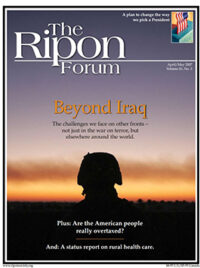What is the best way to pick a President?
With the 2008 campaign season already underway, it’s time to give serious consideration to this question. The election marks a historical rarity – the first presidential contest in decades where both major political parties have wide open races for the nomination, and yet the primary competition could be over by this time next year.
Much of the problem lies in the increasing rush to front-load the calendar, with states pushing their primary dates forward to gain a share of national attention from the media and the campaigns.
Right now, the Democratic presidential nominating schedule begins with the Iowa caucuses (Jan. 14) followed quickly by caucuses in Nevada (Jan. 19), the traditional first primary in New Hampshire (Jan. 22), and then South Carolina’s primary (Jan. 29). The GOP calendar is still in flux, but the voting in Iowa and New Hampshire will likely take place on the same days as the Democratic contests, and the South Carolina Republican primary is currently under consideration for February 2.
What follows is essentially a free-for-all among states hoping to increase their influence in the nominating process. More than 20 states are looking to hold their primaries on February 5 (the earliest date sanctioned by party rules), including a number of larger, vote-rich states such as California, Florida, New York, New Jersey and Illinois.
In fact, almost 30 states are on track to push their presidential nominating contests into January or February of next year. That’s compared to nine states that did so in 2000 and 19 in 2004.
As University of Virginia Political Science Professor Larry Sabato recently quipped, “If the job of scheduling the presidential nominating contests were assigned to an insane asylum, this is pretty much what the patients would come up with.” All kidding aside, the outcomes of the volatile primary schedule are grim – campaigns that begin too early and rely too heavily on fundraising from big donors, as well as a process that leaves most voters in the dust when it comes to choosing their party’s nominee.
 The impact on voter turnout is a major concern for the National Association of Secretaries of State (NASS), which represents the nation’s top state election officials. Studies in 2004 showed that fewer than eight percent of the eligible electorate cast their ballot before the nomination was effectively decided. Meanwhile, eight states cancelled their primaries outright because they were unwilling to foot the bill for an election that had no impact on the outcome of the race.
The impact on voter turnout is a major concern for the National Association of Secretaries of State (NASS), which represents the nation’s top state election officials. Studies in 2004 showed that fewer than eight percent of the eligible electorate cast their ballot before the nomination was effectively decided. Meanwhile, eight states cancelled their primaries outright because they were unwilling to foot the bill for an election that had no impact on the outcome of the race.
The worst consequence of the 2008 primary schedule may ultimately be a general election campaign that lasts nine months and produces candidates who don’t get to know the entire country the way they once had to do.
To address these problems and to create a more rational process, the nation’s secretaries of state are hoping to generate support for the NASS Regional Rotating Presidential Primaries Plan. Our proposal divides the country into four geographic areas – Eastern, Southern, Midwestern and Western – and rotates each region to vote first beginning in March. The other regions would hold their primary elections in April, May and June. A different part of the country would vote first every 16 years. New Hampshire and Iowa would retain their early status to allow under-funded and less widely known candidates to compete through retail politics rather than the costly media-driven campaigns required in larger states.
The worst consequence of the 2008 primary schedule may ultimately be a general election campaign that lasts nine months and produces candidates who don’t get to know the entire country the way they once had to do.
The Carter-Baker Commission on Federal Election Reform, co-chaired by former President Jimmy Carter and former Secretary of State James A. Baker III, endorsed the NASS proposal in its September 2005 report. In addition to increasing voter participation while restoring sanity to the process, it aims to allow under-funded, “no name” candidates to have a fair and fighting chance against the better known candidates with major campaign war chests. Its adoption would greatly increase the likelihood that voters in all parts of the country would have a say in selecting the party nominees for President and that our presidential contenders would be well-versed in public policy issues in all regions of the U.S. (and not just ethanol subsidies in Iowa, for example).
The primary process is badly in need of reform, but it’s too late for 2008. The calendar is being set, and GOP rules say the national convention must determine presidential nominating procedures, not the party. Therefore, the next window for adopting the regional rotating plan is 2012.
With the 2000 election and Bush v. Gore still a vivid memory for election officials, we hope that the parties will seriously consider a proactive overhaul before disaster strikes. We believe that it’s time to look beyond strategy and self-interest to create a process that is in the best interests of our nation’s voters. A regional, rotating system of primaries is a better, more sensible way to choose our President.
Until then, we should be prepared for one very long election cycle.
–###–
Washington Secretary of State Sam Reed is the immediate past president of the National Association of Secretaries of State (NASS). Vermont Secretary of State Deb Markowitz is the current NASS President.




